India's 100-Day Agenda: GTRI Recommends E-commerce Reforms, National Trade Network
By Rediff Money Desk, NEWDELHI Apr 03, 2024 11:09
GTRI proposes a 100-day agenda for the new Indian government, emphasizing e-commerce reforms, a national trade network, and addressing China's growing influence.
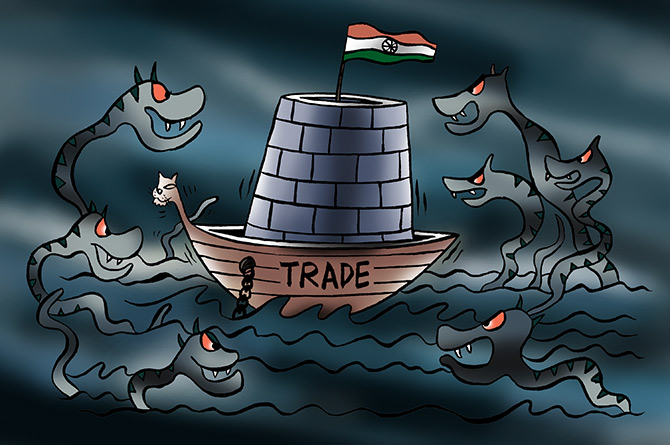
New Delhi, Apr 3 (PTI) Simplification of e-commerce rules, disbursement of duty refund scheme in cash, and setting up of a national trade network, and publishing a report on the effectiveness of India's trade pacts should be part of the new government's 100-day agenda, GTRI said on Wednesday.
The economic think tank Global Trade Research Initiative (GTRI) also suggested the use of blockchain technology for tracing mechanisms for major fruits and vegetable products, allowing special economic zones to sell goods in the domestic market on duty foregone basis, and reducing reliance on China for important imports such as Active Pharmaceutical Ingredients, solar cells, EV batteries, and mobile phone components.
"The first 100 days represent a critical window (for a new government) to set the tone for governance and policy direction," GTRI Founder Ajay Srivastava said.
The seven-phase Lok Sabha polls, the world's biggest election exercise, will kick off on April 19 with the counting of votes set to take place on June 4.
It further recommended the preparation of an action plan for countering the adverse effects of European climate regulation; building alliances, strengthening partnerships for better results at the WTO (World Trade Organisation); highlighting how several WTO laws are discriminatory and need change; and standardising incentives in manufacturing schemes.
It said that a National Trade Network (NTN) would help enable all export-import related compliance online, besides centralising the submission of all required documents and information online, eliminating the need for separate interactions with customs, Directorate General of Foreign Trade (DGFT), shipping companies, ports, and banks.
"It would intelligently distribute information to the relevant agencies, bound by a service agreement to ensure responses within 2-5 hours, allowing online permissions," the think tank said.
Advocating for the NTN, Srivastava said that the current systems, focused on specific departments, are slow to evolve and cannot handle comprehensive processes efficiently.
"An NTN, with a redesigned business process, is necessary for India," he said.
It added that India has 14 comprehensive Free Trade Agreements (FTAs) and six smaller trade agreements and the new government should disclose how these pacts have fared over time.
"This analysis could offer insights into the FTAs roles in boosting exports and inform ongoing trade negotiations," the GTRI said.
It also said the Remission of Duties and Taxes on Exported Products (RoDTEP) scheme incentives are issued in the form of an e-scrip which can be used for imports. Small firms need to sell these at discount to get cash.
RoDTEP scheme is the refund of un-refunded taxes much like the Drawback scheme and hence like drawback, the incentive must be paid in cash and not scrip, it suggested.
"This will improve the liquidity of small firms without any additional revenue outgo to the government. For best results, RoDTEP may be merged with the Drawback scheme and credit the money in one go to the exporter's bank account," it added.
On e-commerce, it said that India has more than 20 lakh firms that produce good quality products and services but less than a lakh of these exports.
"Simplifying RBI, banking, Customs, GST and DGFT rules related to e-commerce export will help them to start exporting handicrafts, jewellery, ethnic wear, decorative paintings, ayurveda, and many more products," it said.
On China, Srivastava said that if left unchecked, in the next few years, every third electric vehicle and many passenger and commercial vehicles on Indian roads could be those made by Chinese firms in India alone or through Joint Venture with Indian firms.
Further it said that the EU's Deforestation Regulation, Carbon Border Adjustment Measures, Foreign Subsidies Regulation, and German Supply Chain Due Diligence Act will hurt India's exports and add uncertainty to exports.
"India must draw an aggressive action plan to counter these and prepare to hit the imports from EU in equal measures," it said.
The economic think tank Global Trade Research Initiative (GTRI) also suggested the use of blockchain technology for tracing mechanisms for major fruits and vegetable products, allowing special economic zones to sell goods in the domestic market on duty foregone basis, and reducing reliance on China for important imports such as Active Pharmaceutical Ingredients, solar cells, EV batteries, and mobile phone components.
"The first 100 days represent a critical window (for a new government) to set the tone for governance and policy direction," GTRI Founder Ajay Srivastava said.
The seven-phase Lok Sabha polls, the world's biggest election exercise, will kick off on April 19 with the counting of votes set to take place on June 4.
It further recommended the preparation of an action plan for countering the adverse effects of European climate regulation; building alliances, strengthening partnerships for better results at the WTO (World Trade Organisation); highlighting how several WTO laws are discriminatory and need change; and standardising incentives in manufacturing schemes.
It said that a National Trade Network (NTN) would help enable all export-import related compliance online, besides centralising the submission of all required documents and information online, eliminating the need for separate interactions with customs, Directorate General of Foreign Trade (DGFT), shipping companies, ports, and banks.
"It would intelligently distribute information to the relevant agencies, bound by a service agreement to ensure responses within 2-5 hours, allowing online permissions," the think tank said.
Advocating for the NTN, Srivastava said that the current systems, focused on specific departments, are slow to evolve and cannot handle comprehensive processes efficiently.
"An NTN, with a redesigned business process, is necessary for India," he said.
It added that India has 14 comprehensive Free Trade Agreements (FTAs) and six smaller trade agreements and the new government should disclose how these pacts have fared over time.
"This analysis could offer insights into the FTAs roles in boosting exports and inform ongoing trade negotiations," the GTRI said.
It also said the Remission of Duties and Taxes on Exported Products (RoDTEP) scheme incentives are issued in the form of an e-scrip which can be used for imports. Small firms need to sell these at discount to get cash.
RoDTEP scheme is the refund of un-refunded taxes much like the Drawback scheme and hence like drawback, the incentive must be paid in cash and not scrip, it suggested.
"This will improve the liquidity of small firms without any additional revenue outgo to the government. For best results, RoDTEP may be merged with the Drawback scheme and credit the money in one go to the exporter's bank account," it added.
On e-commerce, it said that India has more than 20 lakh firms that produce good quality products and services but less than a lakh of these exports.
"Simplifying RBI, banking, Customs, GST and DGFT rules related to e-commerce export will help them to start exporting handicrafts, jewellery, ethnic wear, decorative paintings, ayurveda, and many more products," it said.
On China, Srivastava said that if left unchecked, in the next few years, every third electric vehicle and many passenger and commercial vehicles on Indian roads could be those made by Chinese firms in India alone or through Joint Venture with Indian firms.
Further it said that the EU's Deforestation Regulation, Carbon Border Adjustment Measures, Foreign Subsidies Regulation, and German Supply Chain Due Diligence Act will hurt India's exports and add uncertainty to exports.
"India must draw an aggressive action plan to counter these and prepare to hit the imports from EU in equal measures," it said.
Read More On:
DISCLAIMER - This article is from a syndicated feed. The original source is responsible for accuracy, views & content ownership. Views expressed may not reflect those of rediff.com India Limited.
You May Like To Read
TODAY'S MOST TRADED COMPANIES
- Company Name
- Price
- Volume
- GTL Infrastructure
- 2.93 ( -4.87)
- 226206286
- IFL Enterprises
- 1.30 (+ 4.84)
- 81461564
- Vodafone Idea L
- 16.79 (+ 0.66)
- 67447398
- NCL Research
- 0.95 ( -4.04)
- 31996628
- Franklin Industries
- 3.73 (+ 3.32)
- 21511209
MORE NEWS

Navi Mumbai Airport ILS Signal Testing Begins
The Airports Authority of India (AAI) has begun ILS signal testing at the...

Air India VRS for Non-Flying Staff Ahead of...
Air India has announced a voluntary retirement scheme (VRS) and voluntary separation...
Fisher Groups Oppose WTO Fisheries Subsidy Talks
Small-scale fisher groups from India, Indonesia, and Bangladesh demand WTO keep...




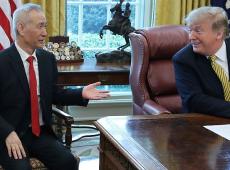

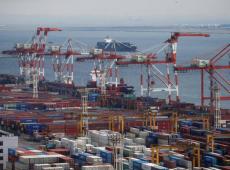


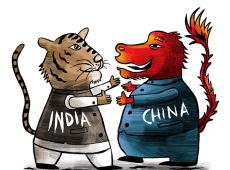
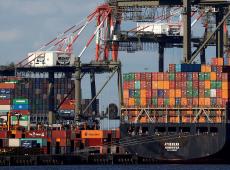

 © 2024 Rediff.com India Limited. All rights reserved.
© 2024 Rediff.com India Limited. All rights reserved.